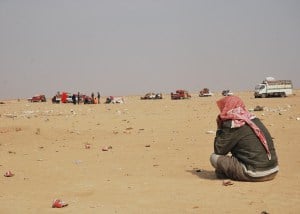This post is also available in:
![]() العربية
العربية
They risk their lives, leaving behind all their past, not caring for anything but those moments that determine the rest of their lives. They are now crossing death to reach a new life. “S.S” from the city of al-Bukamal in the eastern countryside of Deir Ezzor, under the control of Daesh, tells us about his arduous journey from the city of al-Bukamal to the airport of Qamishli, which lasted 19 days.
“We went out from the city of al-Bukamal at dawn, we rode a van vehicle accompanied by some passengers and headed to the city of al-Mayadin to cross to the other bank through manual river crossing. We passed the towns of al-Busayrah, al-Sur and Markada, and then we stopped at the village of Zayanat, the dividing line between the fighters of Daesh and the fighters of the Kurdish People’s Protection Units “YPG”. There was a fierce battle in which the warplanes took part in it, we retreated back a few kilometers, and we saw how the warplanes bombard and also the targets that were being bombed. The driver asked us to go to one of the houses in the village to protect ourselves from the warplanes. A resident of the village hosted us, and he was very generous with us, although his financial condition was not good, and he has clay houses, with no electricity, no telecommunications and no networks. Even the water was not drinkable in all the wells of this village.
We spent 13 days hoping that tomorrow the crossing would open and we would travel. One day, members from Daesh told us, let us send you in trucks to the side controlled by the YPG. We were about 200 passengers , including children, patients, old people and many women. They put us in two trucks in the rear truck box, stamped our passports, and the trucks headed towards the death road between the two parties. The distance was about three kilometers, and in that distance the houses were destroyed and cars were burned. As we approached the barrier of the YPG, they opened fire on us from all directions, the women screamed, the men shouted ”Allah Akbar” and the children cried and screamed. Then one of the men lifted up a white rag. And in quick humming, the trucks quickly turned back with continued firing. I was among the passengers. I do not know what to do. I surrendered to the truth and kept repeating the prayers. The shots were hitting the truck from the right and the left. This was because of their fear of us of being fighters or suicide bombers.
We returned to the house of the man who hosted us, and a few days later a man came to us and shouted: “The crossing has been opened.” The crossing was controlled by the YPG, when they want to open it, they send one truck, which is a signal to the members of Daesh that they can send the trucks and passengers. We rode the trucks and headed again.
We all hoped that our suffering was over and we would travel peacefully. Before we arrived at the barrier, the members of the YPG manning it ordered us to get out of the trucks and sit in front of the barrier and placed us between them and the members of Daesh in anticipation and to deter any clash.
It took us from the afternoon to the middle of the night, with no water or food. Then they called one of the civilians who were with us and talked to him, and he came to us and said that they wanted from each person thirty thousand Syrian pounds to allow us to enter their land while ensuring our arrival at Qamishli airport. After a big controversy we had to pay 25,000 Syrian pounds.
They entered us at 1:00 o’clock at night and brought us cars and took us away, so we were surprised that we were in the city of al-Shaddadah in the countryside of Hasakah. They put us in a big mosque and asked us to sleep until they see what they will do with us in the morning. The women, the men and the children slept together next to each other inside the mosque without a cover or a blanket. We suffered from the lack of water and we had to buy canned water, and the people of al-Shaddadah city were generous with us, where they gave us water and food. At about 11 am they brought us many cars and ordered us to ride in without knowing where we were going.
The cars drove us out of the city of al-Shaddadah with the tight guard and I looked at them and asked myself. Are we in Syria? Is this the province of Hasakah which we know? Or are we prisoners of war in another country we do not know? The cars continued and stopped in the north of al-Shaddadah, an empty desert area, there is nothing in it. They ordered us to get out and to sit on the ground under the sun rays. We asked them ”What does this mean?”, they told us to wait for a UN committee to come. The committee is on the way coming to see the size of the tragedy we are living, and to decide to make a new refugee camp because the camp of al-Houl has been full. We were very angry and we told them ”we are not refugees.
We are traveling and all our guilt is that we have passed through the areas under your control”. They said ”you would wait for the committee to come.” We sat helplessly and the hours went on until it was twelve o’clock at night and we had no choice but to surrender and to sleep on the ground. We entered the third week and our families do not know anything about us. I wondered how these women would be able to sleep like this. Why are we here? What is our guilt? What have we done to be punished this way? While I was thinking, a very loud scream cut the series of my thoughts. A big scorpion stung one of the sleepers. The screams of women and children were heard and everyone in the detention camp ran toward the Kurdish soldiers.
The soldiers rushed up and carried the man to rescue him. There was fuss, fear, resentment and indignation from everyone, and even some of the Kurdish soldiers have handed over their arms to their friends and said to them: “We no longer want to serve in this army while our Arab brothers and families are sleeping on the ground in this humiliating way.”










